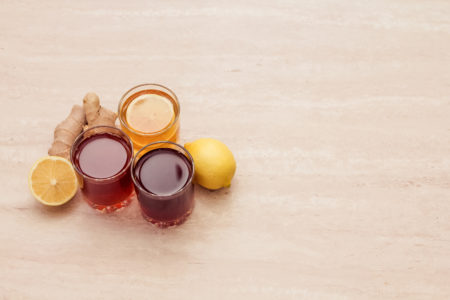A fermented, benefit-rich beverage, kombucha is rapidly growing in popularity.
By Mikaila Rushing, Photo by Sparkman Photography

Eat this: kombucha and other probiotic digestive aids
Not that: probiotic juices and high-calorie drinks with little nutritional value
Says who: Carly Reed Janak, registered dietitian nutritionist at Sparkman Nutrition
What it is: Kombucha is a fermented drink made with black or green tea, sugar, bacteria and yeast. It is often sweet, tart and a bit fizzy, with an alcohol content of approximately .04 percent.
Why: Kombucha contains probiotics, which Reed Janak explains as live microorganisms that, when introduced to the body, have a health benefit for those consuming them. Kombucha, in particular, is meant to help regulate gut health and digestion, and claims have been made that it aids in boosting the immune system.
Reed Janak admits that while the research on the kombucha beverage specifically is still being conducted, “there’s plenty of research on probiotics and the probiotics kombucha contains.”
 It’s been theorized that probiotic digestive aids can help in lowering cholesterol levels, improving lactose metabolism and perhaps even improving mental health, as the gut is one of the primary producers of serotinin, a chemical created by the human body that works as a neurotransmitter. At the moment, though, any potential probiotic benefits remain within the realm of theory, as research is still being conducted on those subjects.
It’s been theorized that probiotic digestive aids can help in lowering cholesterol levels, improving lactose metabolism and perhaps even improving mental health, as the gut is one of the primary producers of serotinin, a chemical created by the human body that works as a neurotransmitter. At the moment, though, any potential probiotic benefits remain within the realm of theory, as research is still being conducted on those subjects.
Regardless, kombucha is a healthier alternative to other less nutrient-rich favored drinks. Arguably, it also has more benefits than other probiotic waters and yogurts.
“The upper hand kombucha has over some other products on the market is that it does tend to be lower in sugar, especially lower than those juice-based products,” Reed Janak says.
Consider:
It’s important to consider the possible drawbacks of drinking kombucha. Because it is a fermented drink, and therefore a living organism, there can be a few unpredicted complications, particularly with home brewing.
“If you’re brewing it at home, it’s an open environment where a lot could go wrong,” Reed Janak says.
There have been some incidents of people becoming ill after drinking poorly made kombucha. These incidents are few and far between, but Reed Janak advices those who might be more vulnerable, such as pregnant or nursing mothers, or those who are amino-compromised, should not brew the drink at home.
While kombucha can be very good for your diet, Reed Janak stresses it should not be considered the one and only probiotic drink.
“Variety is your best option,” Reed Janak emphasizes. “Every fermented food is going to have a variety of probiotic in it, and our gut benefits from having multiple strains [of probiotics].”
She advises adding other types of probiotic waters and yogurts into your dietary mix, as well as making sure the foods you eat are high in prebiotics—garlic, wheat and bananas—so that probiotics can be effective.


